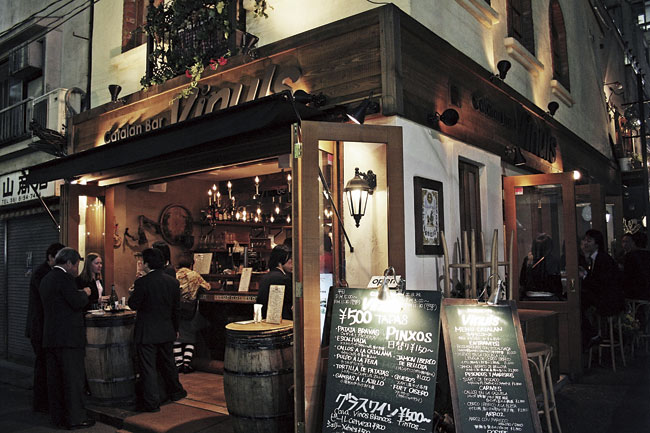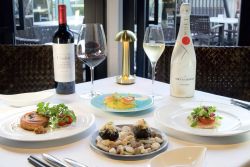
September 17, 2009
The Tokyo Tapas Tour
A Quixotian quest to find the best Spanish nibbles in town
By Metropolis
Originally published on metropolis.co.jp on September 2009

Vinuls
Courtesy of Auxamis
Tapas bars are so three years ago, our knowledgeable Japanese friend tells us. Why would you want to write an article about them now? Tokyo’s foodies have shucked their short-lived obsession with these Iberian watering holes, recognizing them for what they too often are: jumped-up izakaya with higher prices.
That’s a good thing, too. Though there’s still plenty of chaff out there, the city’s tapas scene has been whittled down since the mid-noughties boom, meaning that there are now fewer time-wasters on the dining circuit.
It would be nigh-on impossible to present a definitive guide to Tokyo’s tapas bars, but it’s fun to try. Metropolis spent a heady couple of weeks trawling through some of the best the city had to offer, following friends’ recommendations like swine searching for truffles until we reached the point where the mere thought of another sangria or slice of jamón serrano made us scream “Ay ay ay!” and run for cover.
Sorting the good from the bad isn’t an easy exercise, requiring as it does a totally arbitrary set of rules that everyone else is bound to disagree with. Here are a few of ours: you shouldn’t have to pay more than ¥500 for a slice of tortilla or a glass of house red; décor and ambience are almost—though not quite—as important as the grub; no bonus points for having Spanish staff; paying by the slice for bread is deeply, deeply uncool; ditto table charges in a standing bar.
Things began well with Vinuls, a vibrant little hotspot on a backstreet in central Ginza. There’s a posh sit-down restaurant upstairs, but the main action is at the first floor bar, where salarymen and elegant shoppers spill out onto the street. The tortilla de patatas is a snip at ¥300, and most of the other tapas are priced at an eminently reasonable ¥500 (and no, that doesn’t mean they’re stingy with the portions). The wine comes in beakers rather than glasses, and in a nod to authenticity, the waitress pours the vino blanco from shoulder height—one of those oddball Iberian traditions that we’re not sure we’ll ever understand.
The next night, it was over to Ebisu, which—unsurprisingly, given the neighborhood’s Europhile pretensions—turns out to be a hotbed of tapas joints. Our own trip there didn’t start promisingly, though. Guapos opened in 2006 at the height of the tapas boom, and it has all the hallmarks of a lazy cash-in. The atmosphere is good, but the portions of food are weedy and prepared without an ounce of passion. The sangria (¥500) tasted like dregs from the spit bucket, and—to add insult to injury—there’s even a cover charge.
Heading to the nearby Tio Danjo, the contrast couldn’t be starker. Judged on aesthetics alone, this standing-only bar is as authentic as they come, and the food ain’t bad either. Actually, it was very good—but the dinky helpings didn’t even threaten to fill us up and our companion’s shoes were pinching, so we ended up moving on to Bar de Ollaría. If the tacky décor here almost put us off (and so brightly lit!), the food more than made up for it. The selection of al ajillo dishes (all ¥750) were fantastic, served in covered bowls so hot that the waiter tilted the lid away while waiting for the contents to cool a little. If those don’t sate your appetite, the house specialty will: olla, a substantial Galician-style rice casserole which the staff claim provided the inspiration for the Japanese ojiya (¥1,000).
Our knowledgeable Japanese friend seemed a bit nonplussed when we suggested a trip to Spain Club in Tsukishima the following week. This long-running institution was apparently the go-to place when it first opened, but 15 years down the line it feels rather less essential. More restaurant than tapas bar, it occupies a vast space that’s like an aircraft hanger compared to the other Spanish eateries around town. The sense of intimacy was compounded by frequent staff renditions of “Happy Birthday,” which is one practice that we’d rather see confined to branches of Hard Rock Café. The champiñones al ajillo (¥980) were damn tasty and the crema catalana (¥600) nigh-on perfect, but there was no forgiving the tortilla (¥550), which came covered in a lattice of alioli mayonnaise, like they’d set an okonomiyaki chef loose on it before bringing it to the table.
There were no such problems at La Tapería in Yotsuya, even if this sit-down restaurant didn’t deliver quite the experience that its name seemed to suggest. We propped up the tiny bar next to the toilets and ordered a few dishes from the chiller cabinet while flirting ineptly with the barmaid. Cheapskates are advised to take their business elsewhere, but the aceitunas aliñadas (¥700) were so good we nearly cried, and there’s something disarming about a place that cooks up its tortilla fresh for each customer (¥950). Meat heads can get their fill of both jamón serrano and the harder-to-come-by jamón ibérico (¥1,500 and ¥3,000 for a plateful, respectively).

Casa del Bueno
Photo by James Hadfield
If La Tapería is all about the food, Casa del Bueno is all about the atmosphere. This vibrant spot on Spain-zaka in Shibuya is always packed, and puts its basement location to spectacular use, with legs of ham and chandeliers hanging from the ceilings, and a colossal stack of wine behind the bar. The food is tasty, robust and unlikely to win any culinary awards—but in these surroundings, you’d be a churl to complain. It’s also the first place we’ve ever been to that doles out disposable toothbrushes in the toilet, though whether that’s to ensure that people’s dates go smoothly or simply reduce the damage of the gambas al ajillo isn’t entirely clear.

Las Meninas
Photo by James Hadfield
After nearly getting arrested while heading to the good-but-not-great Bar Camarón in Kamiyacho (it’s a long story), we decided to bring our quest to a close with a trusted favorite. Las Meninas in Koenji is no bigger than our apartment, and run by an affable Englishman whose approach to taking orders normally begins and ends with a quick “Are you hungry?” There’s some real voodoo going on in the kitchen: in three years of eating there, we’ve never been served something we didn’t like. As in really like. Nursing a sherry and tucking into a moriawase plate overflowing with delicious gubbins, suddenly the thought of another week of tapas trawling didn’t seem like such a bad idea. Maybe mañana.
Address Book
- Bar Camarón: 5-8-11 Toranomon, Minato-ku. Tel: 03-3432-8804. Closed Sun & hols. www.camaron.org
- Bar de Ollaría: 1-22-33 Ebisu, Shibuya-ku. Tel: 03-5420-0936.
Open daily. - Casa del Bueno: 11-16 Udagawacho, Shibuya-ku. Tel: 03-5784-0663. Open daily. www.spainbar.net/bueno
- Guapos: 1-3-8 Ebisu-Nishi, Shibuya-ku. Tel: 03-5728-4741. Open daily.
- Las Meninas: 2F 3-22-7 Koenji-Kita, Suginami-ku. Tel: 03-3338-0266. Closed Mon-Tue.
- La Tapería: B1 3-3 Yotsuya, Shinjuku-ku. Tel: 03-3353-8003. Closed Sun. www.la-taperia.com
- Spain Club: 1-14-7 Tsukishima, Chuo-ku. Tel: 03-3533-5381. Open daily. www.spainclub.jp
- Tio Danjo: 1-12-5 Ebisu, Shibuya-ku. Tel: 03-5420-0747. Closed Sun & hols.
- Vinuls: 2-5-17 Ginza, Chuo-ku. Tel: 03-3567-4128. Open daily. www.auxamis.com/vinuls







